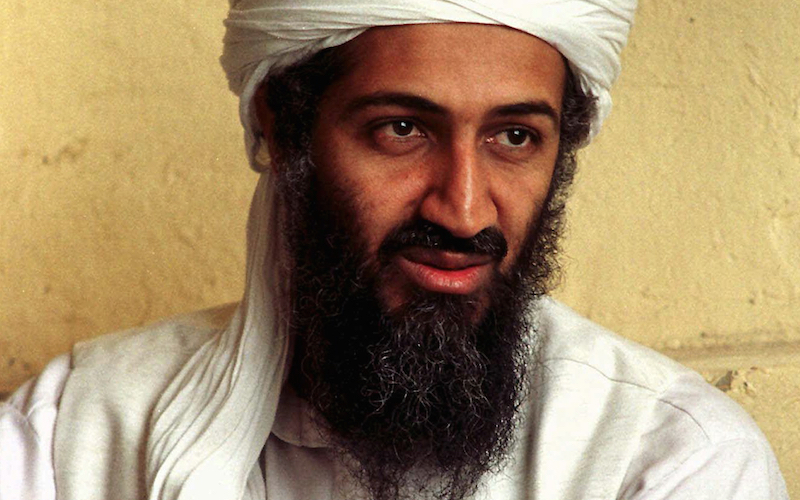
On the 14th Anniversary of 9/11
As I sat in our New York apartment on Friday looking across Central Park I could see the early morning runners, bike riders, and people just leisurely walking through the maze of tree lined walkways. It suddenly dawned on me that it was September 11, the 14th anniversary of the terrorist attacks that changed the world forever.
On that disastrous morning in 2001, I watched on television as the first jet airliner crashed into the World Trade Center at 8:46 am, followed by a second airliner hitting the second tower shortly thereafter. We had been to the U.S. Open Tennis finals the day before. In the dim light of a beautiful sunset we took a photo with the twin Towers in the background. They stood as architectural obelisks reaching towards the sky. We did not dream that they would be gone the next day. We also did not envision that terrorists could again reach our soil so easily. Involved in the attacks were nineteen Islamists affiliated with al-Qaeda. Fifteen came from Saudi Arabia, two from the United Arab Emirates, one from Egypt and one from Lebanon. All were well trained and radically indoctrinated young Muslim men.
I left that night, leaving behind the ‘Big Apple’ the home to many people who immigrated to this land of liberty, freedom and opportunity. As I was working out early the next morning the chaotic attacks were already taking place just a few miles south in the financial district. I was utterly shattered about what was happening in New York. The streets were suddenly empty, although there were some people wandering around–dazed, confused and speechless. Traffic was at a standstill. Everything seemed to come to a halt. No one was in a hurry to go anywhere. Looking at views of the downtown area, all you could see was heavy smoke billowing into the sky.
New York had come together like no other time in history, as I recall, except during World War II. My father, mother, brother and I had escaped Nazi Germany in April 1939, on a freighter to Panama.
In September 1940 we arrived at the immigration processing center on Ellis Island in New York harbor. We were fortunate, while millions perished in the genocide against Jews—another form of terrorism. As immigrants we appreciated the American values and way of life. We cherished the freedom and opportunities America offered. My father soon joined the war effort working at a machine shop making parts for submarines, while my mother sewed items for the military.
By mid-morning on 9/11 all aircraft had been grounded and many airports across the world were closed. Reportedly, some Middle Eastern Royal family members were allowed to leave on their private jets, leaving behind the chaos created by their countrymen. It was commonly known that Saudi and other Arab monarchies supported al-Qaeda. Saudi Arabia had financed over 4,000 mosques, madrassas, and cultural centers around the world. Since the early 1990’s over 2,000 such centers had been built in the United States. The predominant Wahhabi teachings in these madrassas had cordoned off many students within a growing society of extremism. A Daily Times article described some of the madrassas as incubators of extremism and violence, with imams preaching the same form as practiced in Saudi Arabia that justifies armed jihad. Osama bin Laden was one of its foremost disciples.
Former CIA Director James Woolsey had told Congress, “Wahhabi extremism today is the soil in which al-Qaeda and its sister terrorist organizations are growing.” The Council on Foreign Relations noted that Saudi Arabia is the largest source of financing for al-Qaeda. The former publisher of an Egyptian-American newspaper noted that radical Islamic groups have taken over the leadership of many Islamic institutions in the United States. The narrow doctrine includes the killing of infidels, which has become permissible in the Wahhabi teachings. In justifying armed jihad the goal was to create a worldwide caliphate.
Several generations of young men have received radical teachings in this vast network of madrassas. Educated in these institutions they have grown up knowing only the killing around them, or the chance of being killed. Few have ever been exposed to secular education, worked, or planned for a future. Their only thoughts have been to become a terrorist–armed jihad being a way of life.
Terrorist attacks against the U.S. began long before 9/11. In the early 1980s there were thirty-six suicide attacks against Americans in Lebanon. In April 1983 the U.S. Embassy in Beirut was bombed by Hezbollah, killing 63 people. A U.S. peacekeeping force there was attacked regularly by the Muslim military viewing our soldiers as enemies. In October 1983 the Islamic jihad bombed two barracks, killing 241 U.S. troops. In December 1983 a Shiite group with ties to Iran rammed a truck full of explosives into the administrative wing of the U.S. Embassy in Kuwait City, killing five people. In 1993 the World Trade Center parking garage was bombed. In August 1998 the U.S. Embassy in Kenya and Tanzania were bombed by al-Qaeda, killing 224 people. The USS Cole destroyer was attacked in Yemen in 2000, killing 17 sailors.
The 9/11 attacks were planned by Osama bin Laden, our former ally in Afghanistan. It was during the 1980’s after the Soviets invaded Afghanistan that the U.S. clandestinely supported Osama bin Laden and his mujahedeen fighters. After driving out the Soviets in 1989, the U.S. abandoned the mujahedeen and soon Afghan students (Taliban), trained in Pakistan and indoctrinated in Saudi financed madrassas, went back to Afghanistan and took over the country.
In 1990 when Saddam Hussain invaded Kuwait the Saudis allowed U.S. troops on their soil. This angered Osama bin Laden, who said that non-Muslims–infidels—should not be allowed in the land of the two holiest sites–Mecca and Medina. He wanted to use his battle-hardened al-Qaeda fighters to drive the Iraqis from Kuwait. The Saudi Royal family disagreed, and asked him to leave the country. He went to Sudan with two hundred al-Qaeda fighters. There he planned most of the terrorist attacks that ensued. In 1998 Osama bin Laden issued his fatwa–a declaration of war–against the United States. Al-Qaeda is now in over fifty countries.
Pundits continue to argue whether the U.S. should have gone into Iraq in 2003, believing Saddam Hussein had nuclear weapons. Others ask why the U.S. led an invasion into Libya in 2011 was necessary, when Muammar Gadhafi had already given up his nuclear arsenal. The U.S. had supported the Arab Spring which also led to the ousting of Hosni Mubarak our ally in Egypt, Zine El Abidine Ben Ali in Tunisia and Ali Abdullah Saleh in Yemen. None of these countries are better off today, since radical Islamist groups have gained power and influence, filling the void there.
Iraq and Syria have been destabilized by many fighting groups. The U.S. is caught between the Sunni, Shiite and Kurdish factions that have had ethnic differences for centuries. Supporting either has brought us wrath, not friendship. The Ottoman Empire began expanding in the 13th century, ultimately controlling much of Europe, the Middle East, the Arabian Peninsula and North Africa and lasted until after World War I, when the empire was dismantled by the British and French, creating artificial boundaries instead of providing homelands for the different religious sects, and ethnic tribes. Islamic fundamentalists have been waiting ever since for an opportunity to return to power.
U.S. involvement in the Middle East has stirred up Russian and Iranian support for Bashar al-Assad in Syria. We helped arm rebel and Islamist groups indirectly. We don’t even know who the good guys are. In the chaos thousands of refugees have fled to neighboring countries, many finding their way into Europe and possibly the U.S. The procrastination by the Western allies in the region has dislodged an entire generation of desperate people. The U.S. will now need to re-establish the INS registration program, with the National Security Entry-Exit Registration System (NSEERS), to track young Muslim men traveling in and out of the United States.
In 2003 after the U.S. invaded Iraq, Abu Bakr al-Baghdadi founded the Islamic State of Iraq (ISI) militia group. In 2005 he was held at Camp Bucca, a U.S.-Iraqi detention center. He was released in 2009, as considered not to be an enemy combatant. He resumed leadership of ISI, undertaking numerous attacks in Baghdad, killing a Sunni lawmaker and twenty-four policemen. In 2012 he orchestrated suicide attacks and car bombings that killed and wounded hundreds of people throughout Iraq. In 2013 al-Baghdadi expanded into Syria, rebranding his movement as the Islamic State in Iraq and Syria (ISIS). It was well known that al-Baghdadi was an arch enemy of the U.S. since 2003.
The U.S. peacekeeping troops leaving Iraq in 2011 was a mistake, since we left behind a poorly trained Iraqi military with sophisticated armaments. We opened the door to al-Baghdadi who quickly learned what the divided Iraqi troops never did—how to use the military equipment which they commandeered. ISIS has expanded its grip in the region, now controlling large swaths of territory in Iraq and Syria. ISIS continues to grow as recruits flock into their ranks. Even though al-Baghdadi has been seriously injured, the ISIS movement will be hard to defeat. The fear is that the Global War on Terror (GWOT) will go on for a long time. Arab leaders are under siege, but have not combined their military might to take on the ISIS forces, or other Islamist groups that threaten the region, which has also become a quagmire for United States.
Since September 11, 2001 we have lost thousands of innocent lives to Islamist attacks. The U.S. Consulate attack in Benghazi on September 11, 2012 was just another reminder of how vulnerable the U.S. continues to be around the world. We cannot afford another 9/11 disaster, but have opened the door to ISIS and other Islamist groups to attempt such attacks on our soil.
Mohamed Morsi the former president of Egypt, before being ousted in 2013, summed up his belief and that of many Islamic fundamentalists: “The Koran is our constitution, the Prophet Muhammad is our leader, jihad is our path, and death for the sake of Allah is our most lofty aspiration” further noting “this nation [Egypt] will enjoy blessing and revival only through the Islamic Sharia.”
Al-Qaeda leader Ayman al-Zawahri recently noted, “I call on all Muslims who can harm the countries of the crusader coalition not to hesitate. We must now focus on moving the war to the heart of the homes and cities of the crusader…specifically America.” It is not too late for the U.S. to embrace moderate Muslims in the Middle East, Africa and elsewhere. We need to start winning back Muslim friends, even while we take necessary security measures to protect United States.
On my flight back to Salt Lake City on Friday evening, I reflected on the devastation that has taken place since the 9/11 attacks fourteen years ago. We are living in the most crucial time in modern history since the Cold War. Now it is a theological movement that has the mission to destroy Western civilization. I truly hope history will not repeat itself.

